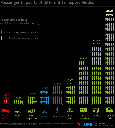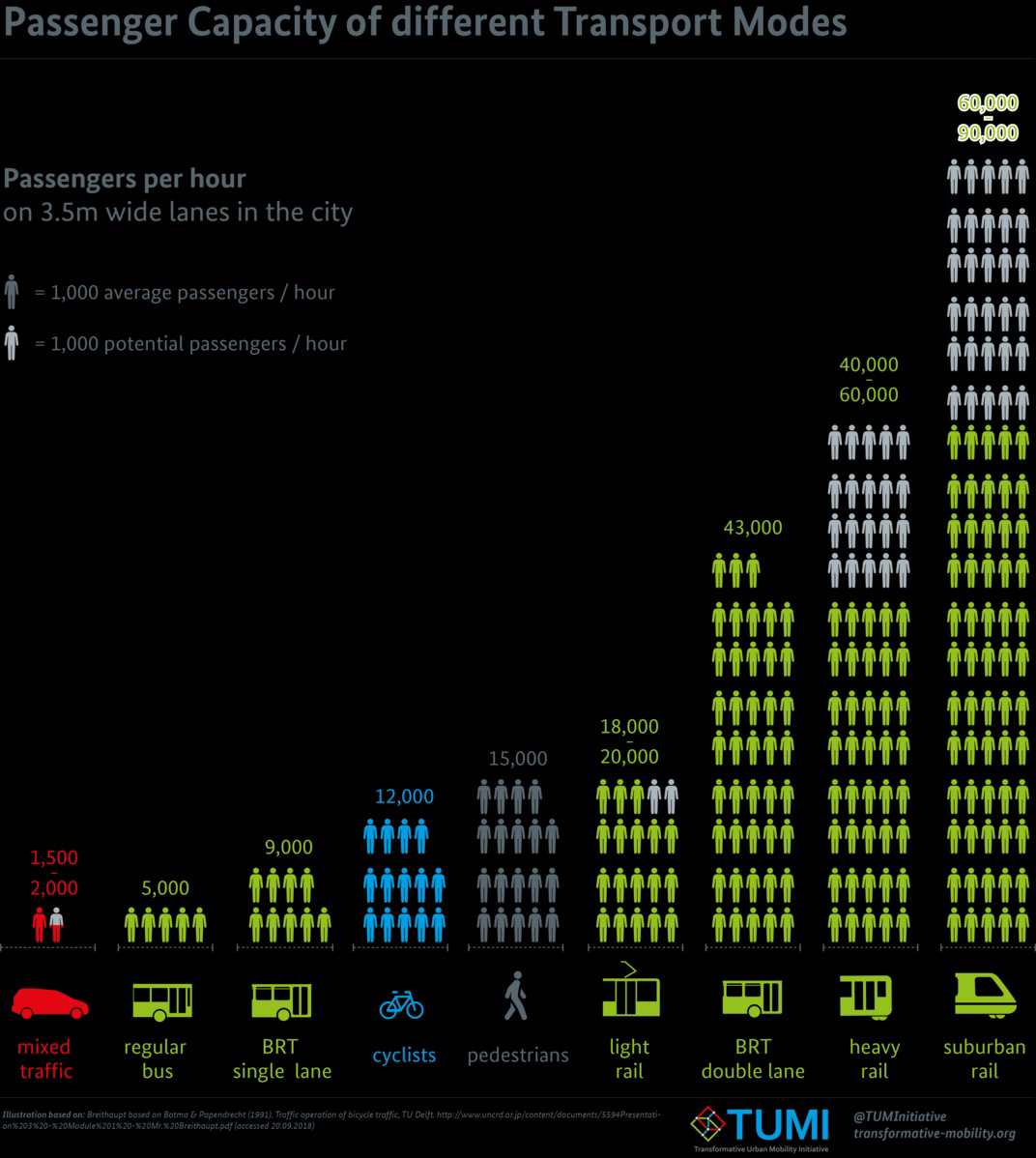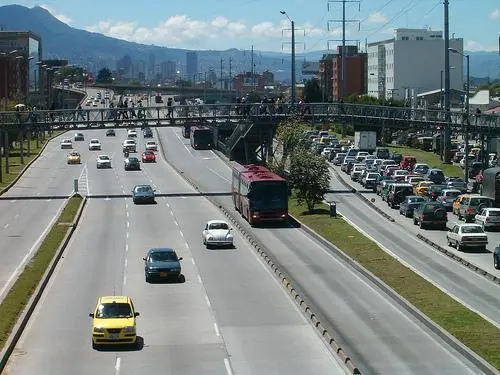[image] Cars are an incredibly inefficient way to move people
[image] Cars are an incredibly inefficient way to move people


[image] Cars are an incredibly inefficient way to move people


It really fucking sucks that the auto industry lobbied the US government so goddamn hard in the 30’s - 70’s and got so much of this country built on car centric infrastructure while also systemically dismantling countless forms of public transit nationwide too. Most major cities and metropolitan areas used to have a pretty comprehensive streetcar system, yet where are they now? That’s right, manufacturers like GM bought majority stakes in those companies and then had their infrastructure dismantled all in the name of “progress.”
As far as I'm aware, the only city in the western world that truly kept its pre-automobile streetcar network was Melbourne, Australia. A result is it today has the largest tram network of any city in the world.
It hurts my soul to imagine how basically every city in North America had similar networks, but they were almost completely annihilated, save for small fragments in a small handful of cities.
Toronto, Canada has kept its streetcar network since they were horse drawn. Today the network is 83km long, or a third of Melbourne's.
Technically Australia is east of the international date line so it's not even really the western world.
This. I don't even have a bus I could walk to oj under an hour's walk. And the buses come every 30 min to an hour. It's brutal.
I did a bicycle+light rail for a year and it took me about 2x the time to get everywhere I needed to go, but I could do it in a car centric city. You can't expect rural folks to have access to public transportation though. Suburbs are a stretch too in some areas.
Why can't we expect rural areas to have some form of mass transit? Having at least a bus system that services a rural area absolutely should be the expectation.
Because a bus that serves a town of 500 people will come once an hour, at most. Also, many people can't walk far to/from the one bus stop. Busses do not solve a problem in small towns, because there is no traffic and plenty of parking.
+1 to this. Buses might not be the best mode for most in rural areas, but they are an essential lifeline for those who can't or can't afford to drive.
Because at that point you're just running buses for individuals at best, but mostly running empty. You'd have to stop at every house.. It would create more emissions that it saves.
Have you looked at a voting map recently? They would never go for it, not in America at least.
Now I can only speak for the US, but most major cities have ring roads or some sort of bypass that would be perfect for a hub and spoke sort of setup alongside them. Maybe it's just the fact that the university I went to famously has a light rail system and the concept is just embedded in me, but I'd imagine the uptake of a park and ride approach with stations out in the burbs (certainly not all of them, but laid out so that you don't need to go more than a burb or two over to reach a station) would be high enough to be worth it. Putting in some shops at the stations like an airport foodcourt would help offset building costs and whatnot to a degree over time as well. Then you could tie the hubs into other major cities in the state and you've got yourself a compelling transit system, doubly so if those cities have subways.
A benefit of starting with a park-and-ride setup is, if you have good protected bike lanes and secure bike parking, you can encourage a lot of bike and ebike trips to the transit hubs. If every suburb isn't too far from a transit hub, that makes a compelling case for bikes and ebikes as first- and last-mile solutions for a lot of people. Maybe not everyone, and maybe not overnight, but definitely for a lot of people. And any improvement is still improvement.
When I switched to riding my bike to work the commute was almost identical. However, I was riding in traffic and after my second close call with a car door I called it quits.
If we had dedicated bike lanes where I live I would 100% still be riding to work.
That's why we need to build trains and trams in rural and suburban areas to save time and money
Yes, but context matters. Nobody is taking a train up the street to get groceries. And using a car (or a huge ass truck) for that is often overkill.
Bikes FTW!
I'm struggling with this average vs potential. If I stand on a 3.5m wide sidewalk on average I'm going to see 15,000 people pass me by? And there is no room for potential improvement as the sidewalks are completely full on average? And how are we figuring cars can potentially be improved by 33%? Are all cars 3/4ths full already?
I'm very pro public transit, I'm just unclear what is being shown in this chart.
They're showing capacity, i.e., a 3.5m sidewalk can move about 15k people per direction per hour. I'm guessing there's leeway for cars depending on intersection types/design, speed, etc., whereas there is much less variation in average speed for pedestrians.
Average should be a measured real world quantity. A max theoretical value should never be average unless it's literally always at the max... on average.
Inefficient energy wise. Not timewise.
This visualization is space efficiency.
Obviously cars have terrible energy efficiency. The most efficient vehicle is a bicycle, since exercise is good for you it's arguably negative energy usage.
As for time efficiency, you have to consider car dependent development as a package. Everything spreads out, so overall there may not be an improvement in time efficiency, especially when you factor in the longer travel time of people not in cars. You could even consider the time spent working to pay for the car, or the time lost from people killed by the car, and I doubt cars would come out particularly time efficient then.
And usage of space. And money, at least if you include all the externalities.
They're measuring how many people can pass through a fixed point in space in an hour, not how long it takes one person to get from point A to point B.
So not really time or energy, but quantity.
Or throughput, which is important in areas with congestion, like busy streets and highways.
Depends on the city and the route. It takes me an hour to get to work by public transit, from my place to the office that's at the other end of the city. Google maps assures me it'd be longer if I drove, and knowing this city I definitely believe it.
Efficiency is not the objective. In fact, were all energy and materials used in making and powering cars from relatively renewable sources, it wouldn't be a problem. I am aware they're not. All else being equal, efficiency is a worthwhile goal. But the tradeoff for inefficiency here is the freedom to go where you want when you want.
There are places here in Europe, contrary to what some people in this community might claim, that simply cannot be accessed by train. Smaller villages and the like.
Access to a car is useful. Ownership might not be unless you live there. But cars have their place.
But cars have their place.
True. However with all the downsides of cars, they should be only the fallback if most other options don't work. As it is, in many places, they are the highest priority that everything is planned around.
Yes. Agreed.
I don't own a car and don't want to, but I do rent one once in a while.
Unfortunately, I'm immunocompromised, so most of these options are too high risk.
There is always exceptions and in some areas, you have to have some cars. But removing most of the cars and replacing most of the 8 lanes of traffic with alternatives would be more than enough.
I wasn't even disagreeing. Not sure why I'm being argued against.
Does "BRT double lane" refer to one 3.5m lane out of two, both together transporting 86k/hour due to leapfrogging efficiencies, or to both lanes together at 7m total? I think it's important to maintain consistency with the 3.5m theme!
I would guess the former, as a single bus line usually doesn't run a constant stream of buses nor express routes, but leapfrogging could allow you to run multiple bus lines along the same corridor, allowing for kinda ludicrous capacities.
Based on this data, the minimum headway and maximum current vehicle capacities, the theoretical maximum throughput measured in passengers per hour per direction (PPHPD) for a single traffic lane is some 150,000 passengers per hour (250 passengers per vehicle, one vehicle every 6 seconds). In real world conditions BRT Rio (de Janeiro, BRS Presidente Vargas) with 65.000 PPHPD holds the record, TransMilenio Bogotá and Metrobus Istanbul perform 49,000 – 45,000 PPHPD, most other busy systems operating in the 15,000 to 25,000 range.
Oh wow, I could believe that now! Tried looking up pics of Rio and Bogotá BRT to see if they are two-lane or one-lane. Some pics look as if it's 2-lane:


People don't drive cars because they think they're efficient in absolute numbers. They drive cars, because cars are way more comfortable and faster than anything else in everyday life.
They're only faster because transit infrastructure is built exclusively for cars at the expense of everyone else, including car drivers. Driving during rush hour sucks, but many people don't have a choice.
Yup. I'd love to ditch my car but it would mean my 20 minute commute would take an hour longer each direction. And this is in (around) Helsinki, Finland, where public transport is really rather good.
The only thing I wish is that we had more accessible and safe single-seat vehicles. I bring 3 empty seats with me to work every day. I would be more than happy to have a cheap, efficient single seat vehicle for commuting if it was safe. I'm not going to ride a motorcycle 25 miles each way every day in the Florida heat and rain. I'm certainly not going to share the road with the maniacs we have here on a motorcycle.
I'm certainly not going to share the road with the maniacs we have here on a motorcycle.
In other words, it isn't that biking or motorcycling or walking or whatever isn't safe, it's that the presence of cars makes everything unsafe (including the cars themselves).
Similarly, bike lanes etc. are car infrastructure, not bike infrastructure, because in the absence of cars cyclists would have no problems using the normal lanes. (Remember that the next time some dipshit complains about spending on bike lanes or cyclists not paying their "fair share.")
Pretty much every argument drivers have against other transportation modes is rooted in projection.
Smart Cars and the like are closer to this, but roads and parking spaces aren’t really designed to take advantage of their comparatively smaller size (eg you can’t drive them side by side down the road).
To be fair, Europe is sort of like this given how small their roads are
Yeah I wish we had a lot more public transit in the USA but a lot of these arguments do not compare convenience in any way. Most of those rail options are in no way more convenient. Especially for long distance. I took a train long distance once; or was almost as bad as flying in terms of schedule. Being able to come and go on my schedule is one of the biggest bonuses of driving.
That said, fuck cars lol
Ain't nothing comfortable about being in an environment where one wrong move will end your life
Not to mention how every time you drive a km, you kill a statistical fraction of a person. How do people do that fucking calculus? How many micromorts are you willing to inflict on others just to get some OJ from the store? People DON'T do the fucking calculus, that's how. They just push it from their minds, like they have been conditioned to by the religion of the automobile ever since birth.
Gonna use some of that suburban rail to travel dooway-to-doorway. Oh wait. No, you can't. It is almost as if having options for different needs is important. Instead let's use overly simplistic explanations for a rather complicated problem.
Where is the plane?
Mods are an incredibly inefficient way to moderate people.
Really the only justification for a car is when you have kids. I have 3 of them, and a car is super super useful. But yeah, for everyone else, use public transport.
That sounds nice in theory, but if your public transportation sucks you're still going to have a car.
Where I live, most places around me that are too far to walk (over 30 mins) but that take 5 minutes by car have terrible public transport. For example, the mall closest to where I live is 45 minutes by foot, 5 minutes by car, and around 30 to 40 minutes on bus (assuming no wait time at all). The reason is that it doesn't go straight to the mall, it goes into many streets on its route and the mall is its last stop.
Similarly, it takes 10 minutes by car to get to the closest train station but about an hour to do it by bus.
That's why I don't think you can simply use a "no kids? no car" logic as a universal one. Rather, the logic would be "use your car as an alternative to public transport". Which means, try to use public transport as primary means, but use the car instead if it's not viable or the difference would be big.
I believe you but to me that just means where you live sucks.
I'm lucky enough I can choose to only live places with good transit options. Sometimes I forget not everyone has that option and when people are like "but the nearest thing is a 45 minute walk" I'm like "so fucking move!" But of course it's not that simple.
But I really would rather people considered the lack of transit options a higher priority. If you lived somewhere without running water you'd probably not put up with it.
You make some good points.
try to use public transport as primary means, but use the car instead if it's not viable or the difference would be big
I agree with you, thanks for improving my 'rule' :)
In a better set up society, public transport is perfect for kids, it teaches them how to plan and how to use public transport, it also gives you all the time to focus on them while travelling instead of being split between the road and the kids.
Sadly not a NL wide thing, but Amsterdam has free public transport for (accompanied) kids in the summer this year, and (accompanied) kids under 12 travel for free on all trains in NL (and have a 34% discount on other modes of transport).